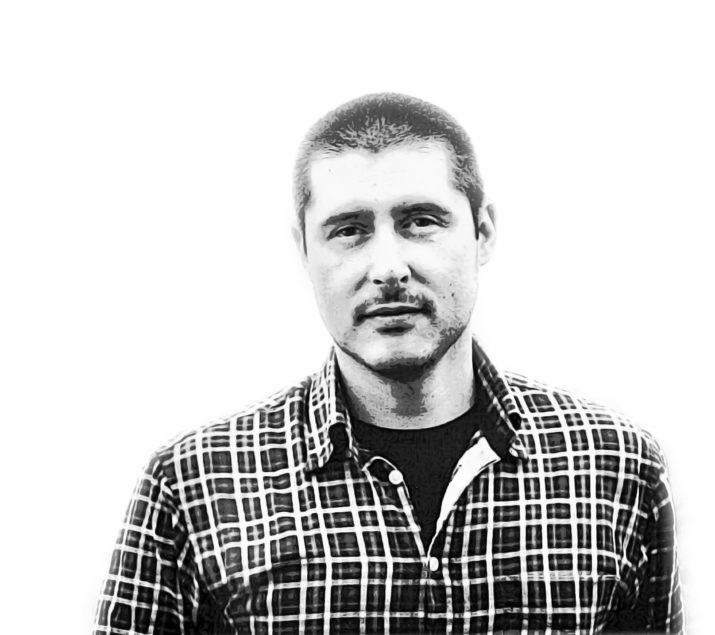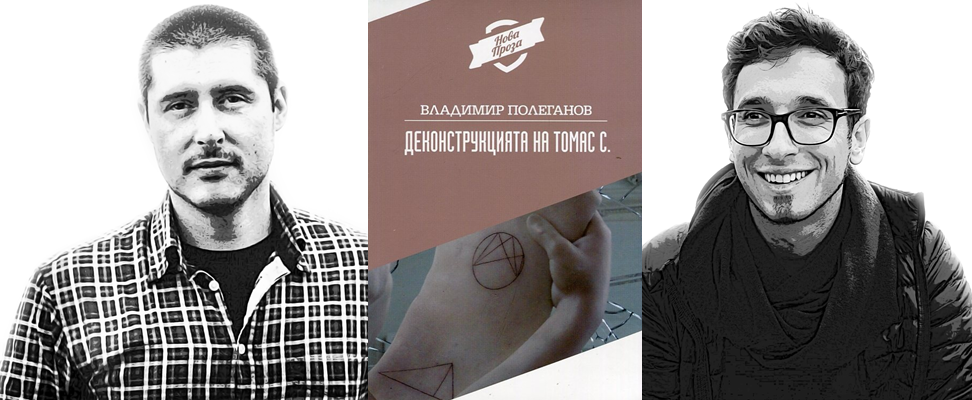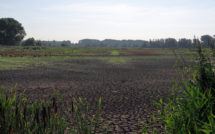

Translated from the Bulgarian by Peter Bachev.
One:
If she just looks long and hard enough through the grimy pane of the southern window, she is sure to see one of them returning to its nest. That’s what she’s been told, though it is unclear to her how to make out the exact location against the towering mountain slope. She has been staring into the distance for several hours now, to no avail—not a single bird, not even a feather. Only the words flutter about in her head that she remembers from when she was a child, her grandmother’s words probably: “Good birds fly south.” If they were to ask her now, she’d tell them: not good, but dark birds, black stains on the evening sky with crimson in their beaks. She doesn’t know what good looks like, feathered or not, but good these birds are not, she is sure of it. Then again, none of them ever leaves this place; they just fly to the mountain and back.
The empty room slumbers behind her. Further behind that: a wall. Behind the wall, in the other room: dust, drain flies, and the sound of words drying and shriveling. He’s at his desk, his typewriter devouring the paper sheet, his wound probably bleeding again. She will take care of it later; just stay here for a little while longer.
The sky has nothing to give her. Nor does time, apparently. Minutes, then hours glide across the blue—those that fly high soon evaporate in the heat, the rest get ripped to shreds by the towers of the town. You can’t say that time is standing still here—she wished she could, but she can’t. Still, its infiniteness is reassuring—sine terminis, there’s always some more of it left. There’s some for her to take now, to sit here, watching. To get up from the chair, turn and face the room, to look around, fix her skirt, and move towards the door. To open it slowly and step through, into the dust, the flies, and his words. To dress his wound again and take care of his stomach. To take care of herself.
Time to figure out what’s going on.
Two:
As she enters his office, the desk is unoccupied. He’s lying on the bed, asleep. The window is open. There is a black feather on the sill. She closes the window, picks up the feather, and puts it in the narrow vase next to the typewriter. There are several others there just like it. He opens his eyes.
“I wrote a little today,” he says.
“I can see that.” She turns toward the typewriter and its half-chewed prey. The white is not enough, there is too much ink. It will always be too much, how could it not be—these words are eating her husband, day by day.
ENOUGH!
The bandage is torn, red stains creeping down each individual thread—barely large enough to cover the wound. The ointments, creams, and disinfectants she uses to clean and dress it have long since been moved from the bathroom to this room, on the shelf next to his books.
“They took me by surprise again. Every single time. I had closed the window, barred it shut . . . Do you see that cardigan? I was wearing it over another one, and a shirt . . . I thought that the layers would slow them down, that . . .”
“Of course they won’t,” she interrupts, telling him to keep quiet and sit still as she removes the dripping bandage and rinses out the raw flesh beneath it. “Have they ever?”
Never, he concedes.
In the beginning, they would both cry each time they had to re-dress the wound. Their nights have been sleepless since he told her he was meant to write. The fury of her screams and the blows from her fists on the day they delivered the typewriter seem distant now, inconceivable. The curt confirmation telegram that the Mayor’s office had sent some days later is now but one of many scars.
He has resigned himself to this new life all too quickly, but she’s not going to follow suit. Oh, he has no idea. One day she will knock the photographs off the wall, breaking their frames, letting all that has been flowing out of them flow out even quicker. What use is it to her anyway? Some pre-writerly past, paralyzed moments in time, impossible now under the tyranny of words.
It is all in her head anyway:
The afternoon walks in the town’s only park.
The midsummer nights’ concerts.
The chocolate ice cream he never quite warmed up to.
The yellow boat in the lake.
It’s all in her head, it clawed its way into her open mouth and curled up in the darkest corner of her brain as she read out the telegram for the first time:
Builder of Society
Category: Writer
From: March of the current year.
They were making a writer out of him. They had already made him a writer. She read the telegram again, hoping the act would invert the meaning of the text, erase the words from the piece of paper, stop the world from turning, or at least make it take a step backwards.
His groans rouse her out of her thoughts. When did he manage to get back to his desk? Whatever happens, I can’t let this moment pass me by.
The next day, when she finds him in a puddle of blood, with several pages of writing stacked neatly next to the typewriter, she decides she has to do something. But first she finds some time to take care of his wounds.
Three:
The woman upstairs lost her mind several years ago. As many years as the pearls in the necklace she never lets out of her grip, she claims, though her medical records probably say otherwise. The writer’s wife visits often, for the comfort of their shared silences: the madwoman’s silence is heavy, imposing, almost operatic in scale; the wife’s: brittle, sinking to the bottom like residue. In the wordless haze of their afternoon silence, each of their heads is like a tower in a drowned city: seen a lot, knows a lot, but mute as a tombstone.
But this time it is different. This is an afternoon of words, unleashed like a cork being popped with the visitor’s cry: “I can’t take it any more”—a tempest that neither of them is able or willing to end.
“Let me tell you how I lost my mind,” begins the madwoman. “It was the very last thing I lost. I held on to it by my fingernails, clutched it till I was blue in the face, but it would not stay. We lose everything in the end, remember—even my mother told me that: that’s the way the world works: all will flow out of you. You, young lady, you have no valves, no doors. But look at me, I’m like a sieve! That’s what she told me and it was all true. I, the fool, went out looking for truth, found it and went mad. Everything you see of me now, every fold and every crease of my once smooth skin is a letter.
But let me spare you the reading: it was finding out where he had gone that drove me mad.
Wait, WAIT! Let me tell you about the birds first: you can’t defeat them. Not the big ones, not the small ones either—they fly, while we only drag ourselves across the ground. All we can do is look up at them. That and curse them. And I cursed, oh, I cursed them for so long I ran out of words. It wasn’t my voice that had gone; it was the words—as if I had squandered them, drank them away. I mean, they came back, of course—anger is what remains when all else abandons you. Still, I’m keeping my words to myself these days. And for you, I guess, on occasion.
I hated you in the beginning, did you know that? I wanted to strangle you—wrap my hands around your delicate neck, there, in that corner . . . I could have done it too, I was stronger then. But because I had once lost my words, I was afraid I’d also lose whatever strength I had, so I let it go. And then you turned out alright, there aren’t many decent people left living in this building . . .
So let me tell you what I saw. I don’t know what it was: salvation or just an escape; whether I should feel fortunate or just sit here and cry. I never figured it out, as much as I mulled it over in that ever-decelerating windmill creaking in my head. I left it in the end, told myself there was no point in trying—I’m mad already, what is it to me to look for his reasons? We need to get used to the feeling of ending, we do, for the end is coming and it’s all we have left to look forward to.”
***
The writer’s wife descends the stairs, replaying the conversation with the madwoman in her head.
“You need to go to the other side of the mountain.” The other side?
“Of the mountain, yes.” It sounds fantastical, somehow, like a fairytale bent out of shape.
“It does, but it isn’t. And you’ll lose him, it is inevitable.” Lose what, she thinks to herself as the ground floor draws near, or whom? Man or mind? And isn’t it the same anyway?
She leaves the useless thoughts at the door and steps inside, the madwoman’s presence following her like a trailing odor. What did you see there?
“What I saw is only for me to know. Whether I remember it, however . . . It’s still somewhere inside me, spinning and smoldering, simmering slowly until, one day, it explodes. I won’t think about it till then.”
***
She tells him there is something she needs to attend to, it will be no more than a couple of days. He is not to write, if possible, and should notify the neighbors, any neighbor, if he absolutely has to. She’ll leave a key in the flowerpot next to the door, and really, he should ask his brother to tear himself away from his precious factory for once and come keep him company. Don’t move too much, only short trips to the bathroom or the kitchen; there’s soup, a pot of casserole, two loaves of bread, and some dessert in the fridge. She kisses him on the cheek. The wound weeps.
Four:
The road to the mountain is straight, tree-lined, and perfect. The wind’s mischievous fingers sway the tops of the poplars, their shadows licking the asphalt’s glistening skin. She walks straight down the middle, trying not to let them get her, as if they weren’t shadows but holes in the pavement, as if she could fall straight through and into nothing. Her eyes are fixed on the mountainside in the distance, on the cloudy tapestry above it. She herself will soon be there, she will soon understand. Or the madwoman will turn out to be a liar, jealous, deceitful . . .
She doesn’t want to think about it, now is not the time. She will just keep walking, up to the end of the paved road, on to the mountain trail and up to the cliffs, then down to the valley beyond. She will not look back, this is no place for regret. She will not look up at the monstrous beaks carrying pieces of her husband and god knows how many other people, which would only make her angry. Oh, how gladly she would set fire to their nests! Or no, not fire—they are already the color of dirty smoke. No, she will choke the infernal throat they fly out of and let them tear each other to shreds. Yes.
Five:
She’s approaching the end of the road. She wants to go on, only a few steps more, but she can’t. She wants to rest her eyes, for just a moment, but she can’t. She wants to turn to stone there where she stands, a delicate calcified tribute to grief and longing, but she won’t. She wishes she were already insane and hallucinating, but she is painfully lucid.
Then she sees it: the house in the forest,
white, beautiful, superimposed onto the landscape, out of place yet unthinkable anywhere else, timeless.
Spring, summer, autumn, winter chase each other around its pristine walls without daring to touch them, like bashful suitors uncertain of their paramour’s favor. This house is the safest place in the world. She can move now, the paralysis has suddenly drained down her leg, slithered away like a snake, and hidden under a stone somewhere. She takes a few steps forward, slowly at first, then almost running, towards the bright wooden door with its shining brass handle.
The stern look of the windows stops her in her tracks: we lead to the soul of this house, they rumble, you can’t run towards the soul of anything. Souls are to be approached reverently, carefully, quietly. Yes, of course, she nods, of course. She remains still.
How is she only seeing them now? There are several of them, perched on the roof, on the sills, one hops a few feet from the door. Their eyes are curious, their beaks full. Her movements have not alarmed them. Only the cold wind seems capable of ruffling their impeccable assembly of feathers. She tries to scream at them and realizes her voice is gone. She’s not surprised, somehow it seems logical. One by one, the birds disappear into the house, through the windows, phasing through the walls, through the door, through the chimney, as if sinking into the reflected image of a house on the surface of the world’s calmest lake. A pestilence wherever they go, she thinks, and takes a careful step towards the windows.
She sees them: the man and the woman.
He is lying on the right side of their bed. She is sitting on a low chair next to him, a wet cloth in her lap and a metal basin by her feet. Her legs are slender, elegant under a short, green dress, a shade of green that evokes autumn, dark and rich next to the hazel of her hair. The man appears to be naked, his lower body under a grey blanket that matches the bedroom’s thin curtains. Grey like the carpet under her delicate feet. The writer’s wife imagines his legs are as strong and muscular as his shoulders and chest, and just as specked with the blood of many open wounds. The pain he must be in is all too familiar. She lets out a muffled sigh and looks on as the birds fly into the room.
One by one they appear, turning their heads around to take in the surroundings, looking for a place to leave their plunder, in order to tear into his flesh again. But no, she is wrong—instead, they hop across the carpet, making their way to the basin. Carefully, without spilling a drop of blood, they empty their beaks into it, by the woman’s feet. She leans down and soaks the cloth in the water, wrings it out and gently runs it across the man’s heaving chest. The skin sizzles and slowly closes, not even a scar to blemish the flawless curve of his torso. The man looks at her. She smiles, then breaks into laughter. Both of them are laughing now. They look happy. They look familiar. The woman outside can’t hear anything; she can only read their faces.
And then she sees the details:
Every single detail suddenly looms into focus. Every line around the man’s eyes, every wrinkle in the white sheets, every speck of dust on the chest of drawers by the door, every spider in every corner and every nook, every color in the photographs of children on the walls, every letter in the book lying open on the bedside table, every intricate outline in the wardrobe’s woodwork, every hair on his body and on the body of the cat sleeping on the left side of the bed, every key of the broken typewriter on the desk. The details wash over her, flow into her body and fill up the space left vacant by paralysis, rush up her veins and arteries and storm her head, devouring her thoughts. It is the details that make this world, this new, terrible world over the mountain, real. Real and impossible for her to be in. She can only stare, or read its signs, but never be of it. Even if she were to reach out, she wouldn’t be able to touch anything. Even if she were to open her mouth, no sound would come out. Even if she were to leave, there would be nowhere to go. You can’t move in a place where you don’t belong, the windows tell her. And she doesn’t nod, because she can’t.
Vladimir Poleganov (b. 1979) is a Bulgarian fiction writer, translator and screenwriter, whose speculative and transgressive fiction explores issues of memory and identity, the environment and the Anthropocene. He won the Helikon Award for his debut novel and the second prize at the Rashko Sugarev’s National Short Story Competition, and he is featured in Best European Fiction 2016 (Dalkey Archive Press), Granta Bulgaria, and Drunken Boat, among others. A former resident at the Iowa International Writing Program, Poleganov has a master’s degree in Clinical Psychology and Creative Writing from Sofia University, where he is currently working on a Ph.D. in Bulgarian Literature.
Peter Bachev holds a Master’s in Gender Studies (LSE), co-ordinates relationships, sex and health education provision in secondary schools across London, and is, shockingly, *not* in the process of writing his first novel. Publications he has translated for include The Stinging Fly, Drunken Boat and Dalkey Archive’s Best European Fiction anthology.
Published on December 11, 2018.




